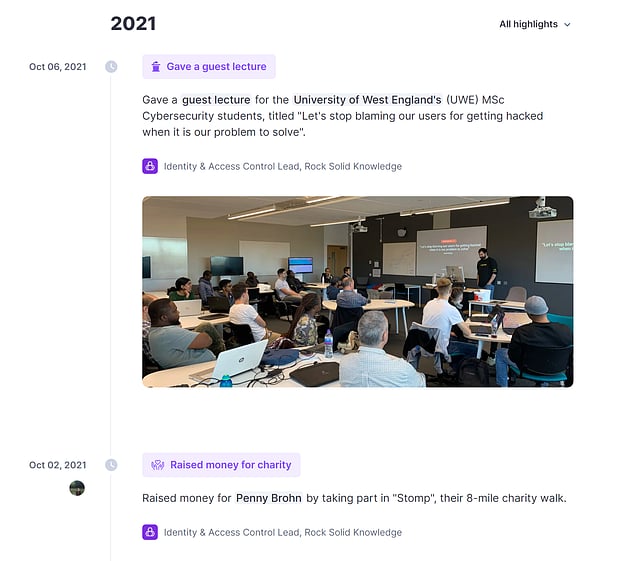
Polywork is a new social media platform that I’ve been using to track my recent achievements, both big and small, and to tackle my ongoing impostor syndrome. This article talks about how I use Polywork to deal with my own feelings of inadequacy and how I encourage my mentees to do the same to build confidence and track their careers.
Impostor Syndrome
In 2018, when I wrote my first yearly review, I talked about my achievements, my favorite memories and planned for the year ahead. I began this review with a bit of squirming:
I know I’ve accomplished a lot these past few years, but I still seem to feel like I’m not moving fast enough or that someone will eventually discover me for the fraud that I am.
This is impostor syndrome, and my wife, colleagues, and friends reminded me of this.
Impostor syndrome affects us all. I’ve experienced it myself, and I’ve seen it in my mentees and in my friends who have decades worth of experience. It’s that feeling of self-doubt, of secretly being a fraud, constantly comparing yourself to people you think are better than you.
While it can be easy to identify impostor syndrome in yourself or others, shaking that feeling is no small task. For example, how many times has someone reassured you that you are doing a good job and yet you haven’t believed them?
To combat impostor syndrome in the past, I’ve used website traffic to measure my success and convince myself of my worth. Statistics and metrics were great for a short-term fix, but as soon as they took a hit or when the next article didn’t go so well, impostor syndrome came rushing back.
I’ve been working on the mental health reasons that can intensify impostor syndrome, but for me, a way of directly addressing my impostor syndrome has been celebrating my wins with yearly reviews.
Reviews & Introspectives
Writing yearly reviews allows me to take stock during the holiday season and pat myself on the back. They’ve also been great to look back on throughout the year to remind me how much progress I have made.
However, throughout the rest of the year, I soon find impostor syndrome sneaking back in. I keep track of developments by throwing significant events onto a Trello board to include in my next yearly review, but plenty of smaller achievements don’t make the cut or simply aren’t applicable. And, as you may have guessed, seeing this list stagnate is yet another source of impostor syndrome and stress.
Ideally, what I need is something to top me up throughout the year, track my progress, and celebrate my achievements throughout the year, both big and small. This is what I’ve found with Polywork.
Polywork: a personable, professional network

Polywork is a new professional social network that focuses on more than just your job title and CV, instead allowing you to build up a timeline of what you’re up to both in and out of work, both personally and professionally.
It gives you a platform to share the victories in your day job, for example, “I released a new minor version”, or “I started my first project using Python”, while also sharing your personal victories, for example, “I ran a 10k” or “I started learning how to brew beer”.
It gives you a professional platform to share your whole self, something that I don’t feel is possible with a CV or your LinkedIn profile.
With LinkedIn, you can show your job history and professional headshot (often in formal business attire). It’s almost like your generic, untargeted CV. Yes, you can share updates, but they don’t display well on your profile, and you’re not encouraged to talk about achievements outside of work.
What you put on Polywork shows what you care about; you get to tell the story of your career rather than relying on the labels your employer has given you and where you went to school. You are much more than just your job title.
Using Polywork to fight impostor syndrome
It took me a while to fully appreciate Polywork; it seemed like a daunting task to keep yet another social media presence up to date. What triggered the Eureka moment for me was seeing some of the custom domains used by the more prominent users of Polywork. The one that clicked for me was “timeline”.
Polywork allows me to create a personable, professional timeline of my career without worrying about how many likes or retweets I get or getting depressed by the lack of page views. I can celebrate the small wins, talk about my career progression, and share the projects I’m passionate about. Polywork allows me to keep tabs on my impostor syndrome throughout the year. It’s certainly more interesting than trying to keep your CV up to date.

Unfortunately, many people with impostor syndrome think they have nothing to share or don’t have any achievements. I recommend starting small. The highlights you post on Polywork don’t have to be groundbreaking; they can be about releasing a new minor version of a product, starting a new project, or maybe about what technologies you are using or learning. You could highlight the progress you’ve made with a new hobby. Check out the “multiverse” section of Polywork to see what other people are sharing, and remember, you are more than your industry.
I always encourage my team and mentees to keep their CVs up to date, even when they are happy in their current role. Not only does this allow you to have a general CV ready to go or build upon when that next dream job comes calling, but it also allows you to keep track of your professional development. By advocating Polywork instead, I’m advocating an engaging way to celebrate your skills while also making CV writing and job performance reviews less stressful.
It’s early days for Polywork, it’s currently mostly a single-player experience, but I like that. And if Polywork doesn’t work out, I still think this is a worthwhile exercise to do yourself, and I’ll be creating my own timeline if Polywork disappears.
I encourage everyone to develop their personal brand, and Polywork is a good first step towards that and to build your confidence. The only thing is, you have to keep at it. Just remember, a little humble bragging never hurt anyone.
Read more
For a more detailed explanation of Polywork and different examples of how to use it, check out the “Why we started Polywork” article.
If you want to take things further than Polywork, then start your own blog! If you’re worried about your writing abilities, check out my embarrassing first-ever blog post. It’ll make you feel much more confident!
